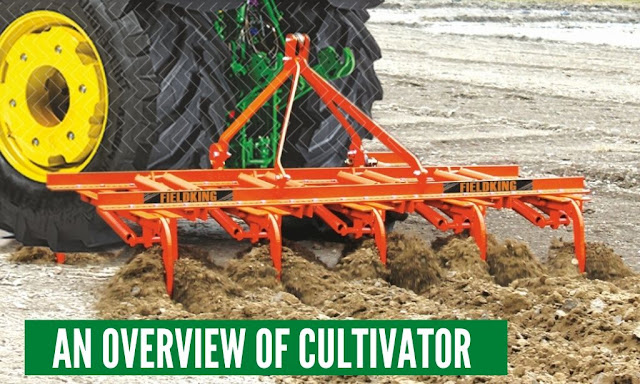 |
| Cultivator |
What is Cultivator?
A cultivator a type of agriculture equipment used to serve the purpose of secondary tillage, soil preparation machine. As its name suggests, It consists of an arrangement of teeth also known as shanks mounted on frame body, penetrate the soil as they are pulled through it linearly. You can also consider it to a machine that use the rotary movement of disks or shanks to accomplish a related result.
What are the types of Cultivator?
Based on use, types of cultivator can be divided into two categories Industrial use and Garden cultivators.
A. Garden cultivators
Garden cultivators are generally small tilling machine, used in small plots such as household gardens and small industrial gardens, can provide both basic and secondary tillage. For example, a rotary tiller, Rototiller, Rotavator, Two-wheel tractor, Mini Tiller etc.
B. Industrial Cultivators/Tiller
If we talk about the Industrial cultivators then these types of Cultivators or tiller usually powered by tractors, used as a tractor attachment. Industrial cultivators can vary in size and shape, from 10 feet to 80 feet wide.
Here is the list of the cultivators used in Farming.
1. Multi-Row Tiller/Cultivators
Farm equipment multi-row cultivator is employed for precise cutting and aeration of the clay, which addresses the soil further fine for better plantation.
2. Double Coil Tyne Tiller/Cultivators
One of the best advantage of double coil tyne tiller early crop residue/weed almost never gets entangled with tyne while ploughing. In this farm equipment, all tynes are adjustable.
3. Dabangg Cultivator/Tiller
This types of cultivator designed for the hard soils can provide depth up to 7" to 9" in hard soil. The best part of this machine is tynes are adjustable
4. Heavy Duty Type Cultivator/Tiller
Heavy Duty Type Cultivator or tiller suitable for use in stone and root obstructed soil, composed for most intricate operations. Prepare seedbeds swiftly and economically.
5. Heavy Duty Rigid Type Cultivator/Tiller
Heavy Duty Rigid Type Cultivator designed to face the toughest work situations of hard black soils.
6. Spring Loaded Cultivators/Tiller
This type of cultivator designed for light and medium soils. Spring-loaded cultivators prepare seedbeds quickly and economically.
7. Extra Heavy Duty Tiller/Cultivators
Extra Heavy Duty Tiller suitable for use in rock and root blocked soil. farmers use it for the toughest operations.
8. Medium Duty Tiller/Cultivators
This type of tiller is best for use in stone and root obstructed soil. Fit for light and medium soil conditions.
9. Tyne Ridger Cultivators
This equipment consists of a heavy-duty box type frame which produces ridge with a maximum width of 900 mm. This equipment is useful for plantation of vegetable, sugarcane etc.
Hope now you get the idea of agricultural machinery cultivators and its type. Know more about cultivator here.





